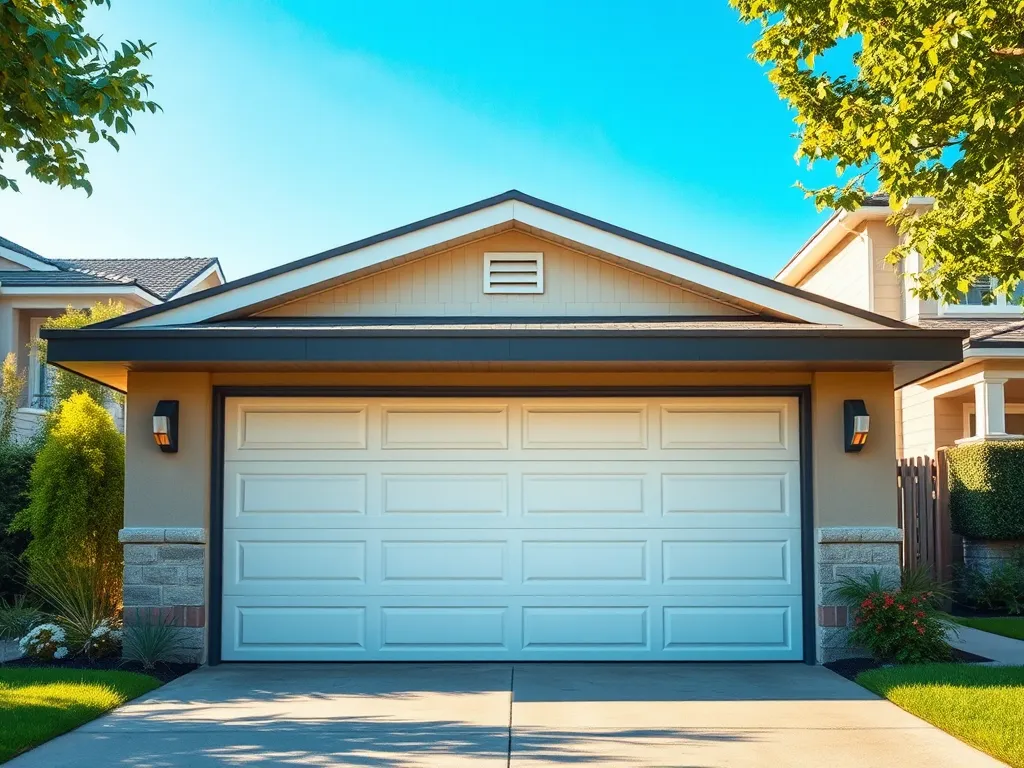Enhancing Home Security: The Role of Garage Doors

The Role of Garage Doors in Home Security
Garage doors play a vital role in home security, serving not only as an entry point for vehicles but also as a barrier protecting the entire household. They often constitute the largest opening in a home’s exterior, making it essential for homeowners to ensure their security features are robust. An unsecured garage can compromise the safety of the home, as it can provide easy access to burglars and intruders. Therefore, understanding The Role of Garage Doors in Home Security is paramount for safeguarding your property and family.
In modern homes, garage doors are not just functional; they are also an integral part of the home’s aesthetic and security features. The Role of Garage Doors in Home Security extends beyond physical barriers. With advancements in technology, garage doors now come with various locking mechanisms, smart features, and sturdiness that enhance the overall security of homes. Knowing the implications of choosing the right garage door and features can have significant impacts on home safety, making it critical for every homeowner to pay careful attention to this aspect of their property.
Additionally, many homeowners overlook the importance of garage door maintenance as part of their home security strategy. Regular checks can identify vulnerabilities that may allow unauthorized access. When neglected, garage doors can become weak points in the home’s defense, allowing potential threats to take advantage of poor security measures. Thus, the Role of Garage Doors in Home Security encompasses not just the physical structure but also maintenance practices that uphold their integrity.
Explore the latest smart garage security systems to keep your belongings safe.
In conclusion, garage doors are central to home security. They provide entry control, shield possessions from theft, and maintain the integrity of the home. Homeowners must prioritize selecting secure garage doors, investing in quality materials, implementing advanced security features, and establishing routine maintenance schedules. By understanding and enhancing The Role of Garage Doors in Home Security, individuals can significantly bolster their home’s defenses against intrusions.
This article aims to explore the various dimensions of garage doors and their security relevance, emphasizing the types of doors available, security features to consider, common vulnerabilities, upgrade options, and maintenance protocols for optimal effectiveness.
Types of Garage Doors
There are several types of garage doors, each with unique characteristics and security features. Sectional garage doors are among the most common choices due to their space efficiency and insulation properties. These doors consist of several horizontal panels that operate on tracks. They offer good security features including sturdy locking mechanisms and solid materials. The design minimizes gaps that intruders could exploit, making them a secure option for homeowners concerned about breaches.
Roll-up garage doors are another type that provides security benefits, especially for commercial properties. They are made of narrow slats that roll up into a coil above the opening. Pros include strength and resistance against forced entry, but cons include limited insulation and the need for careful maintenance to ensure tracks remain functional and secure. Depending on the materials used—such as galvanized steel or aluminum—security can vary significantly.
Enhancing your home's safety starts with garage entry point fortification.
Swing-out and swing-up garage doors can add a unique aesthetic to homes but come with specific security implications. Swing-out doors require space to operate, which can be a disadvantage in tight spaces. Additionally, while they can be aesthetically appealing, their hinges and locks require regular maintenance to ensure they are not easily manipulated by burglars. Homeowners should regularly check the lock strength and material integrity to enhance security.
Implementing secure garage door features for home protection can significantly enhance your home's safety.
Garage Door Security Features
Smart garage door openers have revolutionized security by allowing homeowners to control access remotely via smartphones or other devices. These systems often come with features like alerts for unauthorized access attempts, logs of door activity, and the ability to grant temporary access to guests. The role of smart technology in enhancing security cannot be underestimated as it provides real-time updates and control over what was once a vulnerable access point.
The importance of sturdy materials for garage doors also plays a significant role in security. Materials such as fiberglass, steel, or reinforced wood are ideal choices for homeowners seeking to enhance the protective qualities of their garage doors. These materials withstand impacts better than lighter alternatives, adding a layer of defense against break-ins. Choosing the right material enhances durability and creates a formidable barrier against intruders.
Locking mechanisms are also essential for ensuring the security of garage doors. High-quality deadbolts, automatic locks, and secure handles help augment protection and prevent unauthorized access. Homeowners should consider a multi-point locking system, which would offer increased security by locking at several locations along the door, making forced entry more difficult for intruders.
Common Garage Door Vulnerabilities
Despite advancements in garage door security, common vulnerabilities remain prevalent in many systems. These can include outdated locking mechanisms, weak materials, and insufficient reinforcement. Additionally, gaps or misalignment in garage door seals can create opportunities for intrusion. Homeowners need to be aware of these weaknesses to strengthen overall security.
Burglars often exploit garage doors as points of entry due to several factors, including unsecured locks and easy-to-manipulate systems. Many intruders use simple tools to force open less secure garage doors. Additionally, if the garage connects directly to the home, any breach can compromise the rest of the property. Awareness and proactive measures can greatly reduce the risk of such vulnerabilities being exploited.
To mitigate these vulnerabilities, homeowners can employ preventative measures such as regular maintenance, installing security cameras, and employing alarm systems specifically for garage doors. By reinforcing the door structure, upgrading locks, and ensuring proper alignment, the potential for intrusion can be significantly reduced, making it crucial to develop a proactive approach to garage security.
Upgrading Garage Door Security
Best practices for upgrading garage door locks include consulting with security professionals to assess current systems and implement high-grade locks. Homeowners should consider systems that integrate with smart home technology, offering features such as remote monitoring and alert systems. Regularly updating these locks and hardware to the latest technology ensures ongoing protection against intrusion.
Smart home integration for garage doors has become increasingly popular. Homeowners can connect their garage door systems to broader home automation systems for more streamlined control and monitoring. Such integrations allow homeowners to control access remotely, helping provide peace of mind when away from home. Utilizing technologies such as voice commands, mobile apps, and remote access enhances overall security measures.
Incorporating surveillance systems with garage doors enhances security significantly. Installing cameras that monitor the garage area deters intruders and provides critical evidence in the event of a break-in. Surveillance systems can connect to mobile devices, giving homeowners real-time access to footage and alerts, which further enhances security strategy and responsiveness to potential threats.
Maintenance for Security
Regular maintenance tips for garage doors include inspecting springs, cables, and hardware for signs of wear and tear, lubricating moving parts, testing opener function, and ensuring seals and weather stripping are intact. Routine checks can prevent malfunctions that may lead to security breaches, helping maintain overall efficiency and effectiveness of the door.
How maintenance impacts security effectiveness cannot be overstated. Regular upkeep helps identify vulnerabilities early, preventing deterioration that could make the garage door more susceptible to forced entry. Maintaining a secure, properly functioning garage door offers peace of mind and significantly reduces potential entry points for intruders.
Signs of wear and tear that may affect security include uneven door movement, rusted tracks, fraying cables, and weak springs. Homeowners should be vigilant in addressing these issues promptly to avoid compromising their garage’s protective capabilities. Regular inspections and prompt repairs are key in ensuring that garage doors continue to serve as effective barriers, supporting the overall security of the home.
